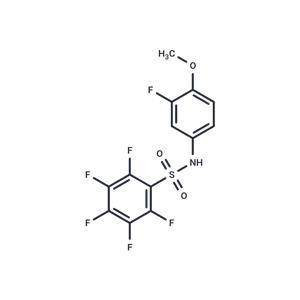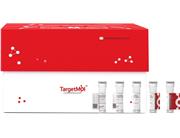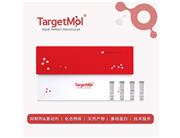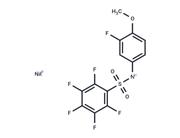| Name | Batabulin |
| Description | Batabulin (T138067) is an antitumor compound that binds covalently and selectively to a subset of the β-tubulin isotypes, disrupting microtubule polymerization. This disruption affects cell morphology, induces cell-cycle arrest, and ultimately leads to apoptotic cell death. |
| In vitro | In MCF7 cells, the treatment of Batabulin (T138067; 30-300 nM; 24 hours) shows approximately 25-30% tetraploid (4n) DNA content in cells and 25-30% apoptosis. After a 48-hr exposure to 100 nM Batabulin, approximately 50-80% of the cell population is undergoing apoptosis. Batabulin binds covalently and selectively to a subset of the β-tubulin isotypes, thereby disrupting microtubule polymerization. Covalent modification occurs at a conserved Cys-239 shared by the β1, β2, and β4 tubulin isotypes. Cells exposed to Batabulin become altered in shape. |
| In vivo | Batabulin (40 mg/kg; i.p.; once per week; on days 5, 12, and 19; male athymic nude mice) treatment impairs the growth of the drug-sensitive CCRF-CEM tumors. |
| Storage | Powder: -20°C for 3 years | In solvent: -80°C for 1 year | Shipping with blue ice. |
| Solubility Information | DMSO : 100 mg/mL (269.35 mM), Sonication is recommended.
|
| Keywords | multidrug-resistant | polymerization | cytoskeleton | covalent | Apoptosis | Cys-239 | β-tubulin | arrest | Inhibitor | Microtubule/Tubulin | Antimitotic | inhibit | T 138067 | Batabulin | T-138067 | cell-cycle | antitumor |
| Inhibitors Related | Stavudine | 5-Fluorouracil | Kaempferol | Myricetin | Meclizine dihydrochloride | Sodium 4-phenylbutyrate | L-Ascorbic acid | Metronidazole | Sorafenib | Tributyrin | Salicylic acid | Oleic acid |
| Related Compound Libraries | Bioactive Compound Library | Anti-Cancer Clinical Compound Library | Drug Repurposing Compound Library | Microtubule-Targeted Compound Library | Bioactive Compounds Library Max | Anti-Cancer Drug Library | Anti-Cancer Active Compound Library |

 United States
United States



